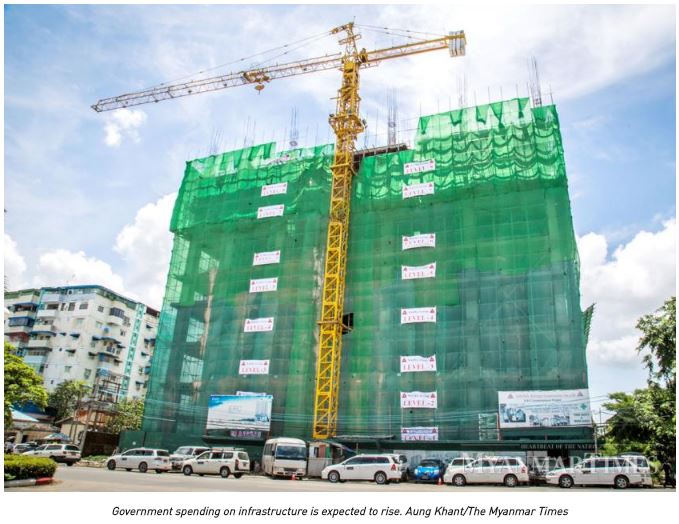Myanmar: Budget deficit reaches record high, yet SOE money remains untouched
The government’s budget deficit in the upcoming 2018-19 fiscal year has reached the highest over the last seven years. Economists said this record-breaking deficit needs to be addressed, together with a range of other issues, such as the inflation rate, the Kyat’s depreciation and the slowing down of economic growth. Otherwise, the population will feel the squeeze.
Finance minister U Soe Win submitted the government’s budget for 2018-19 fiscal year to the Pyidaungsu Hluttaw on July 23.
The total revenue, including tax, exceeds K20,051 billion and total spending exceeds K24,954 billion. The deficit for this budget exceeds K4,903 billion. The record budget deficit used to be the 2016-17 fiscal year with K4,642 billion.
A widening budget deficit risks leading to a higher pace of inflation. Economist have warned that businesses and the public will be hit hard by further inflation.
Dr Aung Ko Ko, a Myanmar economist, said that “as public spending increases, so will the inflation.”
Since the revenue for the budget was raised from the public, he argued, the question should be how the public spending will benefit the country. He urged parliament to deliberate individual spending proposals carefully instead of dwelling on the deficit issue. The spending needs to be scrutinised because the country’s foreign debt has reached US$10 billion.
In addition, the depreciation of the Kyat has led to higher import prices. As the kyat is depreciating in real terms (since early 2015, the kyat-dollar exchange rate has weakened by more than K400), Dr Aung Ko Ko said attention should also be spent on boosting exports.
 The budget deficit has hit a seven-year high on the back of higher spending. The Myanmar Times
The budget deficit has hit a seven-year high on the back of higher spending. The Myanmar Times
State-owned enterprises
Meanwhile, funds accumulated by some state-owned enterprises (SOEs) are rising. Revenue from the SOEs – K7,743.85 billion – makes up 38 percent of total government revenue. The budget allocation for SOEs is K8,971.03 billion. Many of the taxes collected by SOEs have been transferred to the state Myanmar Economic Bank. Between 2012 and January 2017, SOEs deposited a total of K11.5 trillion in their so-called “Other Accounts”, according to a report released by the Renaissance Institute and Natural Resource Governance Institute. This money has been held by the bank as savings accounts, which do not accumulate interest for SOEs. Since the Kyat is depreciating, these SOEs have lost more than $2 billion in purchasing power over the last three years. All of that money could have been spent on supporting the country’s infrastructure and social services. These profits are not part of the budget, while debts and liabilities of some enterprises are absorbed by the government.
On July 25, the defense and information ministries wrote to parliament on using the K8,175 billion kept in these “Other Accounts”.
Should the profits accumulated be used for the budget?
Dr Maung Maung Thein, an economist and former deputy finance minister, argued that the “Other Accounts” is reserved for emergency and not appropriate to be spent on balancing the books.
Regardless, a lot of oversight is necessary for the spending, especially regarding these SOEs. Writing in The Myanmar Times last month, Andrew Bauer, NRGI consultant and one of the co-authors of the report, stated that unexplained expenses, in huge sums, are allowed to “go unchecked”.
“For instance, we found a K369 billion foreign exchange loss due to currency revaluation. Neither the Myanma Oil and Gas Enterprise [MOGE] nor the bodies meant to oversee it could explain where this money was transferred.
“This is not a problem specific to the MOGE; nearly all SOEs sign contracts and make payments without other bodies knowing why they were signed or made. While we do not think there was corruption in this instance, the mystery highlights serious weaknesses in SOE accounting systems,” he explained.
Stronger growth needed
While the budget deficit is a function of government revenues and spending, increased foreign investment contributes to the economy in many ways, which in turn is key for the budget, according to Jeremy Mullins, managing director of FMR Research. A stronger economy contributes to a healthier government budget through higher tax collection and reduction of various government expenditures.
“In Myanmar’s case, there’s a number of broad improvements that can contribute to a stronger economy.
“These include reducing red tape, speeding up various approval processes and attracting more foreign investment, which contributes not only the project or company itself, but is also often a driver for improvements in the broader economy,” Mr Mullins told The Myanmar Times.
The country has revised two key legislations – the Investment Law and the Companies Law – to attract inward investments. However, the main economic hold-up isn’t “from some crucial law that, once in place, will suddenly kick-start the economy”. Instead, major challenges include reducing various forms of unnecessary red tape which keeps investors away, improving credit access, speeding up approval processes and simplifying government interactions.
“It’s heartening to see things are recently moving in the right direction, but of course more can be done, more quickly,” he added.
Source: https://www.mmtimes.com/news/budget-deficit-reaches-record-high-yet-soe-money-remains-untouched.html


 English
English




